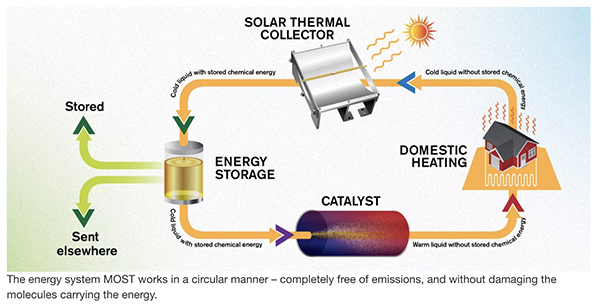
New energy system prototype from Chalmers University that can store the sun’s energy for up to 18 years. Image by: Chalmers University of Technology
According to Science Alert, scientists have recently figured out a way to store solar power for up to 18 years.
It’s made possible with a specialised fluid, called a solar thermal fuel, that’s catching the attention of numerous investors, according to the research team at the Chalmers University of Technology working on the project.
“A solar thermal fuel is like a rechargeable battery, but instead of electricity, you put sunlight in and get heat out, triggered on demand,” explains Jeffrey Grossman, an MIT engineer who works with these materials.
When sunlight strikes the molecule it turns into an energised new version of itself, called an isomer. When this happens, energy from the sun is captured and remains even when the molecule cools down to room temperature. Because of this, “the energy in the isomer can be stored up to 18 years,” explains nanomaterials scientist Kasper Moth-Poulsen, one of the team researchers on this project.
“And when we come to extract the energy and use it, we get a warmth increase which is greater than we dared hope for,” says Moth-Poulsen.
The team is testing this energy system prototype on the roof of a university building. The system works in a circular manner, where stored energy can be cycled—releasing energy in the form of heat as needed. The group has successfully gone through this cycle more than 125 times.
“Today, we have an emissions-free energy system which works all year around,” says Moth-Poulsen.
They expect this system to one day heat homes, power building water heater systems, dishwashers, clothes dryer and much more. The team predicts this technology could be commercially available within 10 years.
Moth-Poulsen is not alone in his goal to create solar power that is more energy efficient and effective. Scientists and engineers from around the world will be meeting in Glasgow, Scotland from July 21-26, 2019 at the Electrochemical Conference on Energy and the Environment this summer. The international meeting will focus on electrochemical energy conversion/storage materials, concepts, and systems, where researchers will share results and discuss ideas within the field.
Learn more about the ECEE 2019 meeting and submit your abstract today.

